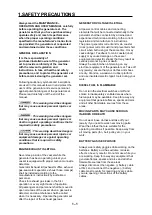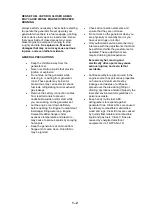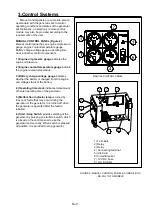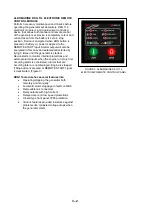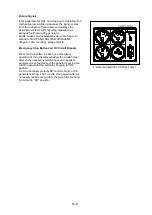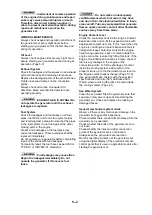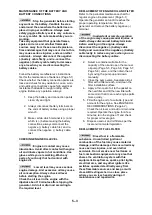
1
–2
Check all connection elements and
ensure that they are not loose.
Do not work on the generator when you
are physically or mentally tired or you
have used drugs or alcohol.
Only authorized service personnel may
intervene with the adjustments that shall
be performed while the generator set is
operated. These adjustments are
required training and experience.
Excessively hot, moving and
electrically driven parts may cause
serious injuries, and even lethal
accidents.
Antifreeze (ethylene glycol) used in the
engine coolant has poisonous properties
on humans and animals. Destroy
leakages and wastes of antifreeze
spread over the area during filling or
draining operations at stated properly the
laws and environmental regulations on
poisonous waste.
Keep handy multi-class ABC
extinguishers to respond against
generator fires. Class A fires are caused
by ordinary combustible material like
wood and rags; Class B fires are caused
by quickly flammable and combustible
liquid and gas fuels; Class C fires are
caused by energized electrical
equipments. (ref. NFPA No.10).
DENSE FUEL VAPOR IN CLOSED AREAS
MAY CAUSE DIESEL ENGINE OVERSPEED
RUNNING
Always perform necessary checks before starting
to operate the generator. Never operate your
generator when there is a fuel seepage, gobbing,
leak or dense fuel vapor in closed areas. Dense
fuel vapor inside of closed areas may cause
diesel engine to overspeed running, to stop
roughly and late.
So explosions, fires and
damages that may occur may cause serious
injuries, and even lethal accidents.
GENERAL PRECAUTIONS
Keep the children away from the
generator set.
Never use startup liquids that provide
ignition or explosion.
Do not step on the generator while
entering to or exiting from generator
room. These parts may be bent or
broken thus may cause electric shock,
fuel leak, refrigerating liquid or exhaust
gas leakage.
Remove the battery connection cables
from lead terminals to prevent
undesirable sudden motor start while
you are working on the generator set.
Let the engine cool down definitely
before opening the Engine Coolant Heat
Exchanger filling water cap. Engine
Coolant Heat Exchanger under
excessive temperature and pressure
may cause to serious scalds by spraying
hot vapors.
Keep the generator set, cabin bottom
flange and its area clean. Oiled fabric
may be ignited.
Summary of Contents for MG 309
Page 4: ......





